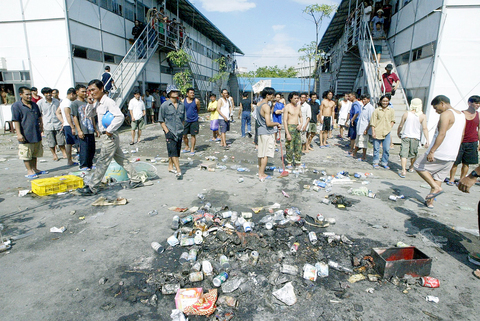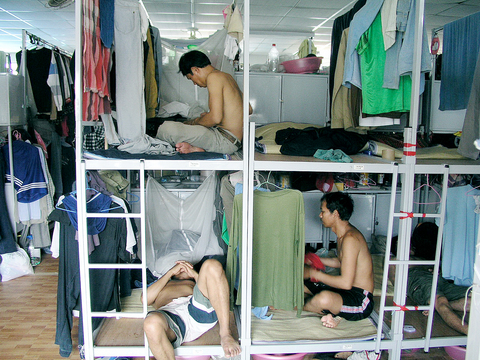Furious with what they saw as inhuman personnel management, some 300 Thai workers in Kaohsiung set fire at the management center, a work dormitory, cars and other facilities Sunday night, police said.
Television stations aired footage of the workers clashing with police, attacking them with rocks and bottles in the overnight riot.
Several officers were injured by rocks shot with slings by the Thai workers, while one Thai worker was injured by broken glass in the dormitory, police said.

PHOTO: REUTERS
The riot began about 9:30pm Sunday at the five-story dormitory housing 1,700 Thai workers, who are building the Kaohsiung mass-transit system. The management company was hired by the Kaohsiung Mass Transit Bureau to manage the workers' living conditions.
"Some Thai workers clashed with management personnel, who tried to discipline the drunken workers who were shouting in the dorm. The management personnel stopped one Thai worker from using a cellphone and reportedly hit him with an electric prod," the Broadcasting Corporation of China (BCC) reported.
"The two incidents prompted the Thai workers to vent their pent-up anger at the management, so they rioted," it reported.

PHOTO: WANG RONG-HSIANG, TAIPEI TIMES
In addition to the bans on alcohol, cellphones and Thai television in the dormitory, the Thai workers were required to use tokens in the dorm store, but they allege they were short-changed when exchanging the script for real money, it added.
Of the 1,700 Thai workers in the five-story dorm, some 300 took part in the riot, setting fire to management offices and cars, burning clothes and hurling rocks at police who responded to the fire report.
Police, members of Thailand's representative office in Taipei, the construction company and the recruiting firms' representatives were involved in negotiations with the Thai workers to end the standoff.
Authorities yesterday agreed to the demands made by several hundred Thai workers, ending the confrontation.
But officials also decided to charge the rioters and deport them for starting the riot, which cost the employer at least NT$10 million (US$322,500) in damages.
"After three rounds of talks, the Thai workers have agreed to end their protest and return to work after the management company accepted most of their demands," said Fang Lai-chin (
The workers demanded that they be allowed to use cellphones, that food quality at the cafeterias be improved and that a satellite dish be installed so they can watch TV programs from their home country.
They also protested the management company's unreasonable methods of payment -- for each 100 hours of overtime, they are only paid for 46 hours.
The workers also complained that they could not take back food and daily necessities that were not purchased at the dormitory store.
The Huapan Co last afternoon agreed to most of the workers' demands.
Fang said the labor authorities will investigate the management methods of the company and will ask that the company dismiss supervisors treating the workers in inhuman ways.
Meanwhile, officials threatened the workers who took a stand against the company with deportation. Lai Chin-lin (賴勁麟), vice chairman of Cabinet's Council of Labor Affairs, said workers found guilty of starting the riot will be deported for violating law and order.
He said the council will also punish the employer, the Kaohsiung Mass Transit Bureau, for mismanagement by slashing by 800 the number of foreign workers the company is entitled to import to help it construct the transit system.
Asked for comments, Premier Frank Hsieh (
"These people [foreign workers] flew far away from their homes and came to Taiwan for jobs, and most of them are doing heavy-duty work, such as construction work. Basically, we should try to understand their feelings," the premier said.
"Employers should pay attention to these foreign workers' emotions from time to time, because it will be too late to do so when tragedy happens," he said, adding that he has already directed the Council of Labor Affairs (CLA) to look into the latest incident.
There are some 100,000 Thai workers in Taiwan.
Additional reporting by Jimmy Chuang

CHAOS: Iranians took to the streets playing celebratory music after reports of Khamenei’s death on Saturday, while mourners also gathered in Tehran yesterday Iranian Supreme Leader Ayatollah Ali Khamenei was killed in a major attack on Iran launched by Israel and the US, throwing the future of the Islamic republic into doubt and raising the risk of regional instability. Iranian state television and the state-run IRNA news agency announced the 86-year-old’s death early yesterday. US President Donald Trump said it gave Iranians their “greatest chance” to “take back” their country. The announcements came after a joint US and Israeli aerial bombardment that targeted Iranian military and governmental sites. Trump said the “heavy and pinpoint bombing” would continue through the week or as long

TRUST: The KMT said it respected the US’ timing and considerations, and hoped it would continue to honor its commitments to helping Taiwan bolster its defenses and deterrence US President Donald Trump is delaying a multibillion-dollar arms sale to Taiwan to ensure his visit to Beijing is successful, a New York Times report said. The weapons sales package has stalled in the US Department of State, the report said, citing US officials it did not identify. The White House has told agencies not to push forward ahead of Trump’s meeting with Chinese President Xi Jinping (習近平), it said. The two last month held a phone call to discuss trade and geopolitical flashpoints ahead of the summit. Xi raised the Taiwan issue and urged the US to handle arms sales to

BIG SPENDERS: Foreign investors bought the most Taiwan equities since 2005, signaling confidence that an AI boom would continue to benefit chipmakers Taiwan Semiconductor Manufacturing Co’s (TSMC, 台積電) market capitalization swelled to US$2 trillion for the first time following a 4.25 percent rally in its American depositary receipts (ADR) overnight, putting the world’s biggest contract chipmaker sixth on the list of the world’s biggest companies by market capitalization, just behind Amazon.com Inc. The site CompaniesMarketcap.com ranked TSMC ahead of Saudi Aramco and Meta Platforms Inc. The Taiwanese company’s ADRs on Tuesday surged to US$385.75 on the New York Stock Exchange, as strong demand for artificial intelligence (AI) applications led to chip supply constraints and boost revenue growth to record-breaking levels. Each TSMC ADR represents

State-run CPC Corp, Taiwan (CPC, 台灣中油) yesterday said that it had confirmed on Saturday night with its liquefied natural gas (LNG) and crude oil suppliers that shipments are proceeding as scheduled and that domestic supplies remain unaffected. The CPC yesterday announced the gasoline and diesel prices will rise by NT$0.2 and NT$0.4 per liter, respectively, starting Monday, citing Middle East tensions and blizzards in the eastern United States. CPC also iterated it has been reducing the proportion of crude oil imports from the Middle East and diversifying its supply sources in the past few years in response to geopolitical risks, expanding